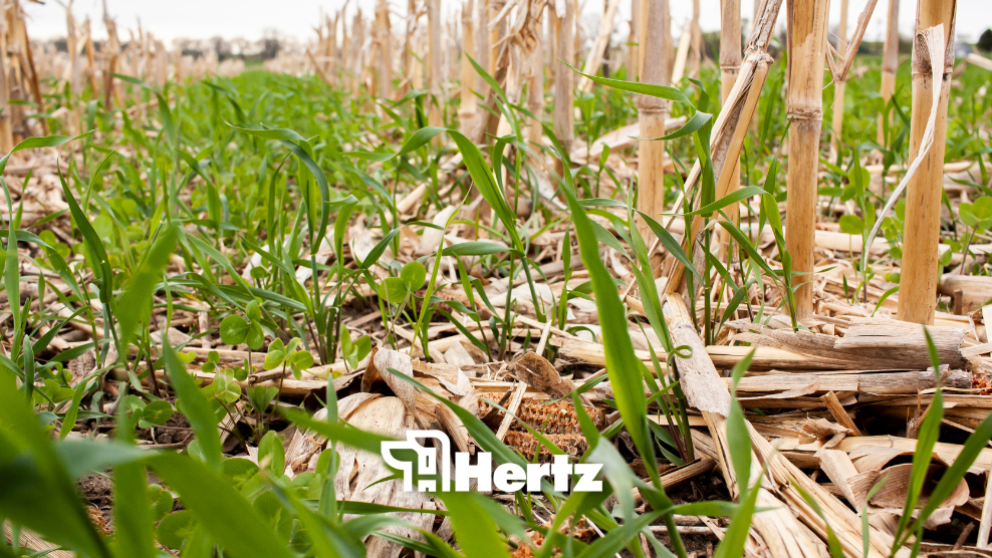Fall Projects and Cover Crops

Now is the season for fall projects on farms. It's essential to make sure that farms are being cared for. Fields with rolling topography can be prone to erosion. Maintaining these types of fields so that erosion can be, at the very least, mitigated - if not prevented - is important because farmland - generally speaking - is worth a lot of money. Any asset worth a lot of money ought to be kept in good condition, right?
When it comes to projects, one key to success is to get multiple opinions. The more experts you speak with, the more you will find patterns of similarities and differences in techniques, ideas, philosophies, beliefs, etc. The more we educate ourselves, the more confident we can be in decision-making. Part of the "school of hard knocks" education is listening to what others have to say and sharing ideas.
You may find that your philosophy as a farmer or landowner (regarding any farm improvement project) will differ from that of the contractors you meet with. One contractor may say the "Cadillac" version of a remedy may best fit your farm and situation. A different contractor may have a different approach that looks more like a Chevy.
So who's right and who's wrong? Perhaps that's the entirely wrong question to ask.
When helping people determine a direction that works for them, here is what is worth exploring: What experiences do you have that form your philosophy? Vise versa, what experiences does the contractor have that shape their opinions on the matter? Are we open to new ideas and differences of opinion?
Start with that.
Do you have a problem that needs to be fixed? How much are you willing to spend? The pros and cons need to be weighed with any improvement project. Conversation about how to solve problems is essential. We ought to share ideas and help each other out.
Even better - perhaps - is discussion and dialogue about how to prevent problems from happening. An ounce of prevention is worth a pound of cure.
In terms of erosion, one idea worth exploring is how soil health principles can improve rainwater infiltration through the soil. If the soil can absorb the rainfall - rather than be washed away by it - the rain would be beneficial rather than harmful. The Agricultural Industry ought to explore how to maximize the benefits of rainfall. Cover crops are one method that could potentially serve as part of the solution.
Critics will tell me that nobody can do anything to prevent a 6-inch hard rain from washing soils down the field. Maybe that's true. I won't disagree. While I cannot argue that point, I don't have to throw my hands up and wave a white flag. I've seen valuable farms in rough shape because of the "there is nothing we can do about a hard rain" attitude. My job is to make sure farms are being cared for. To do that, I am not afforded the luxury of excuses. Instead, I ask questions, read books, and explore ideas through writing.
Can cover crops play a role in erosion prevention by improving rainwater infiltration? If so, there may be an opportunity to simultaneously use cover crops to solve another problem. Toxicity.
News flash: a lot of people in America don't like herbicides, pesticides, and fungicides. Considered by some as pollutants, pesticide use began in the 1880s to kill bugs and prevent diseases in crops. Copper-based fungicides were first used in France to combat downy mildew and save the vineyards. This history of pesticide use is tied to famine prevention. Today, pesticides, herbicides, and fungicides are used frequently. From the coating of seeds to spraying bare soil to spraying growing crops, a lot of money is spent on these types of products for agricultural production. No doubt that some of these chemical compounds end up on the soil. In fact, the purpose of residual herbicides is to remain in the soil and prevent future weeds from germinating and emerging.
What if certain plants had the ability to remove toxins from the soil? Phytoextraction and Phytoremediation are the technical terms. And if that's true, could those plants also be used as cover crops to help prevent soil erosion? And if that's possible, how could we put two and two together here in Northeast Nebraska to lead the way in restoring confidence in our Nation's food system and food quality - all while ensuring that our own farms are cared for?
Whether or not "pesticides" are actually harmful to people - I'll probably never know the truth. What I do know is that some people in America think the use of pesticides is a real problem. I also know that soil erosion is a real problem. All I am sharing today is the idea about using cover crops as a means to help mitigate both problems.
Most folks won't stop using pesticides next year, and we could very well soon see a rain event hard enough to cause erosion. It's worth considering how to maximize the benefits and reduce the risks of rainfall and pesticides in our soils. Why not?






